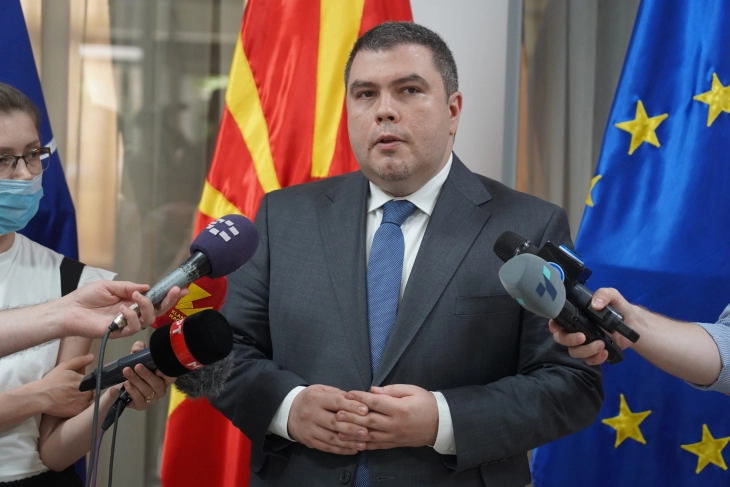Marichikj expects amendments to Electoral Code to be passed before Parliament’s summer recess
- Post By Nevenka Nikolik
- 16:05, 28 July, 2021

Skopje, 28 July 2021 (MIA) – Amendments to the Electoral Code should enter parliamentary procedure on Wednesday or Thursday at the latest at the proposal of a group of MPs, while Justice Minister Bojan Marichikj expects them to be adopted by the end of July, before the Parliament’s summer recess.
In addition to the OSCE/ODIHR recommendations, they include a compromise proposal on conducting the upcoming local elections, which according to both the ruling party and the opposition are to be held on October 17. Open lists are part of the compromise proposal, as well as a three-percent threshold for preferential council candidates which has been criticized, by the smaller parties in particular. However, according to Marichikj, it is a good proposal and there’s possibility it undergoes changes in parliamentary procedure.
According to the Justice Minister, a lot of time has been dedicated to work on the amendments to the Electoral Code, negotiations have taken place on several levels until this compromise proposal was reached, which includes the open lists. Talks have been held with all stakeholders as part of working groups within the Ministry of Justice, and later the proposal was discussed at the level of the four largest political parties that have their representatives in the State Election Commission (SEC), whereas the next phase included talks with parties that don’t have members in SEC but have MPs in Parliament.
The model is a compromise and, Marichikj noted, that doesn’t mean that everyone has agreed. Some parties wanted to link the open lists with the electoral model for the parliamentary elections but such proposal wasn’t welcomed by the rest.
The proposal may undergo amendments during the procedure or it may not be adopted because, Marichikj pointed out, that depends on the will of the majority of MPs.
However, the Minister doesn’t expect blockades to the amendments because, according to him, most of the amendments refer to the implementation of the OSCE/ODIHR recommendations which are to improve the election process and this is in the interest of all political parties. Marichikj added that it would be a precedent to go to the polls for the first time without having adopted most or part of the OSCE/ODIHR recommendations.
“I expect dialogue, I expect debate and I expect the law to be passed either in this form, which would be the best, or in an amended form according to the will of the MPs,” said Marichikj.
As regards the proposed election model, he clarified that what was established as a compromise proposal was to have open lists with one preference of one councilor in addition to choosing a party, coalition or a list, i.e. citizens to have the possibility to also choose when voting a number before the name of the preferred councilor.
“The councilors who will get more than three percent of the votes of the registered voters in a particular municipality would enter preferentially first, while the other councilors, the other seats won by a party, coalition or list will be filled according to the order of the proposed candidate lists as was the case so far. If citizens don’t want to vote preferentially for one councilor, their vote will be considered only for a party, coalition or list, and the mandates will be distributed accordingly afterwards. Also, if a citizen chooses more than one preference, the vote will be considered only for the party. This is the essence of the model. The essence is to make it possible for citizens to vote for individuals in addition to voting for a party or a coalition of parties, and it would be ideal if we do that,” Marichikj said.
In terms of two-percent threshold for independent candidates, he stressed that this percentage was proposed based on talks with political parties, and he believes it is a compromise proposal that should be passed in Parliament.
“Independent candidacies can be achieved, these are not unattainable numbers in many municipalities. However, it will depend on both the initiative and the will of the citizens to support independent lists, so I think where there is will, the numbers are not unattainable and the threshold of two percent can be reached,” said Marichikj.
The Minister of Justice believes that the amendments will be adopted, otherwise voting will be the same as before. However, he noted it would not be good to thwart the idea of open lists.
“I believe it is a positive step forward, and the open list model should be supported regardless of the fact that it may not be an ideal one or that it has its shortcomings. But these local elections should really be given that opportunity. If certain shortcomings are identified, the model can always be changed, but we’ve never had open lists to know which model works and which model doesn’t. We have proposed a model that reflects the compromise will of the parties and I think it is good to adopt it,” said the Justice Minister.







